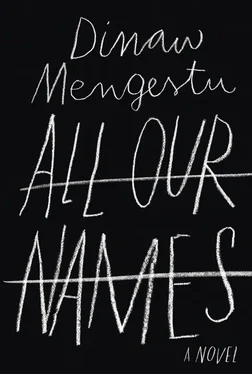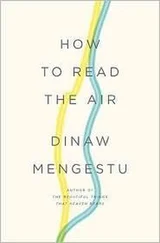Isaac hadn’t gone far. He was standing a few feet away from the front door, near the very top of the steps, with both hands tucked into his pockets, as if I had caught him in the middle of a late-afternoon stroll across campus.
“I apologize for leaving so abruptly. I didn’t understand what you were saying in there. Next time, please speak louder.”
I wanted to hug him again. There was a natural, easy charm to his words, and, more than that, forgiveness. No one else I had ever met spoke in such formal sentences. I had been told when given his file not to be offended if he didn’t speak much, since his English was most likely basic, but I remember thinking that afternoon that I felt like I was talking with someone out of an old English novel.
At the office the next day, when David asked what Isaac was like, I told him he was kind and had a nice smile and an interesting face, all of which was true and yet only a poor part of what I really wanted to say. David half listened to my description of Isaac. When I finished he asked me, “And what else, other than the obvious?”
“He has a funny way of speaking,” I said.
“Funny how?”
“He sounds old.”
“That’s a new one. Maybe it’s just his English.”
“No,” I said, “his English is perfect. It’s how I imagine someone talking in a Dickens novel.”
“Never read him,” he said.
And neither had I, but it was too late to admit that Dickens was merely my fall guy for all things old and English. From that day on, David and I took to calling Isaac “Dickens.” When Isaac and I went to find more furniture for his nearly empty apartment, I told David, “I’m off now to see my old chum Dickens.” In meetings, David would ask how Dickens was getting along in our quaint town, which only a decade earlier had stopped segregating its public bathrooms, buses, schools, and restaurants and still didn’t look too kindly upon seeing its races mix.
“He’s doing very, very well,” I said, in what was as close as I could come to an English accent.
A month later, after Isaac and I had spent a half-dozen nights intertwined in his bed till just before midnight, I brought him a copy of A Tale of Two Cities . He had a growing stack of books, used and borrowed, around his bed, but none, I had noticed, were by Dickens.
“A present,” I said. It was unwrapped. I held the book out to him with both hands. He smiled and thanked me without looking at the cover.
“Have you read it already?” I asked him.
“No,” he said. “But I have every intention of doing so right away.” I laughed. I couldn’t stop myself. He was so eager to please. I had to confess: “We have a nickname for you at the office. We call you Dickens.”
Only then did he look at the cover.
“Dickens,” he said.
And again I was afraid I had embarrassed him. He flipped the book over and read the description on the back and, as he did so, smiled. It was the same expression he’d had on his face when I found him on the library steps.
“I could do much worse here than that,” he said.
What Isaac and I never had was a proper start to our relationship. We missed out on the traditional rituals of courtship and awkward dinners that most couples use to measure the distance they’ve traveled from restaurant to bedroom. No one watched us draw closer, and no one was there to say that we made for a great or poorly matched couple. The first time Isaac placed his lips on mine was in his apartment after I had shown up unannounced to check on him. He had been in town for two weeks, and we already had a routine established. I picked him up from his apartment every other day at 4 p.m. In the beginning, our afternoons were spent primarily doing errands. I drove Isaac to the grocery store, bank, and post office.
I spent an afternoon waiting with him for the telephone company to arrive, and when it came to furniture, I was the one who picked out the couch, coffee table, and dresser from the Goodwill store two towns away.
Isaac told me he knew how to cook, but not in America.
“The eggs here are different,” he said. “They are white, and very big. And I don’t understand the meat.”
And so I taught him what few domestic acts I had learned from my mother. I taught him how to choose the best steaks for his money from the grocery store. I held a package of discounted beef next to my face for contrast and said, “See those pockets of fat? That’ll keep it from drying out,” and told him that if he had any doubts he should smother it in butter. Eggs, I told him, were an entirely different matter. “I hate them. You’ll have to find a better woman than me for that,” I said.
I knew that part of the reason I had been given this job was that David assumed that it would play to my motherly instincts, and that, as the only woman in the office without a family, I had the time. I never had those instincts, however. I watched friends from high school and college grow up, get married, and have children, and the most I had ever thought about that was “That could be nice.” My mom had been that kind of mother, and if Isaac had been from Wyoming, I could have dropped him off at her house the day he arrived and never thought of him again until it was time for him to leave.
“She would have made you fat,” I told him. “And the only thing you probably would have ever heard out of her was a list of what was in the refrigerator and what time you could expect to eat.”
• • •
That kiss happened September 3, in the doorway between his living room and bedroom, just after we had returned to his apartment from buying silverware and plates. He was on his way to the bedroom and I was leaving the bathroom when we collided in the hallway, which was wide enough for only one person to pass at a time. Forced to stand face to face, what could we do but smile?
“Do you live here as well?” Isaac asked me.
“I do now,” I said, and, without thinking, we leaned toward each other, me up and him down, until our lips met. We kissed long enough to be certain it wasn’t an accident. When we opened our eyes and separated, what we felt wasn’t surprise so much as relief that our first moment of intimacy felt so ordinary — almost habitual, as if it had been part of our routine for years to kiss while passing.
I was late getting back to my office, but had I not been, I would still have wanted to leave on a dramatic note. I grabbed my jacket and thought of walking forcefully out the door, stopping for one final, brief kiss, but once I was close to him, I wanted to press my nose into the crook of Isaac’s neck so I could smell him, and that was exactly what he let me do.
“You are like a cat,” he said.
“You smell like onions,” I told him.
He craned his neck around mine. We held that pose for at least a minute, at which point I pulled away so I wouldn’t have to worry about him doing so. When I was back in his apartment two days later, I walked from room to room as soon as I entered. Isaac asked me what I was doing. I took his hand and pinched the flesh between his thumb and index finger before wrapping my arms around him. “I’m making sure you’re really here,” I said. He lifted my chin up to his lips and kissed me quickly.
“Does that help?” he asked. It did, but it wasn’t enough. Compared with others, Isaac was made of almost nothing, not a ghost but a sketch of a man I was trying hard to fill in.
I nudged him backward until we landed on the couch. I felt his legs trembling; I was relieved to know he was nervous.
“I’m still not convinced,” I said. My doubt became the cover story we needed to take each other apart. Isaac kissed my neck, and in return, I took off his shirt and placed his hands on the bottom of my blouse so he knew he should do the same. I kissed his chest and he kissed mine. Once we were undressed, he asked, “And what about now?”
Читать дальше












